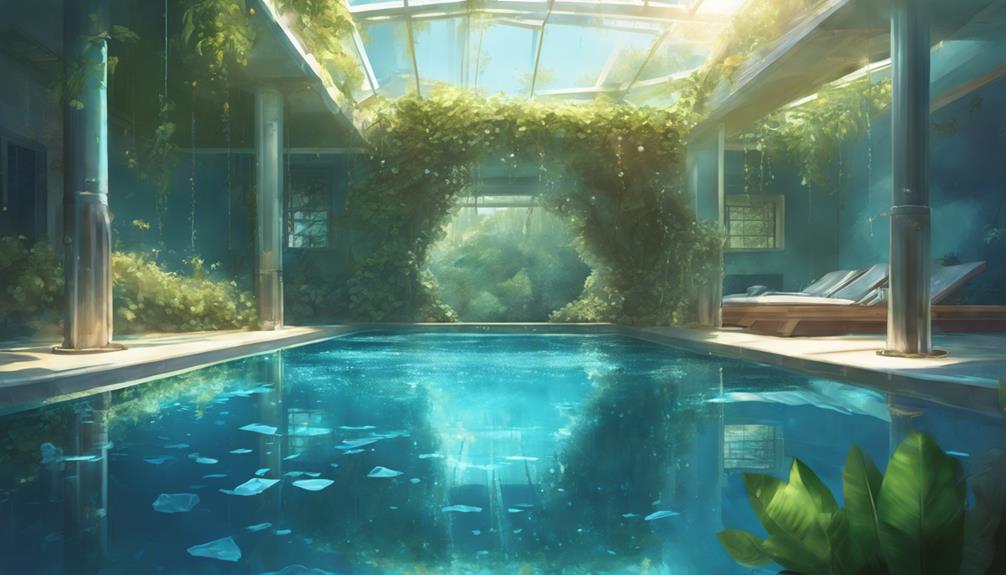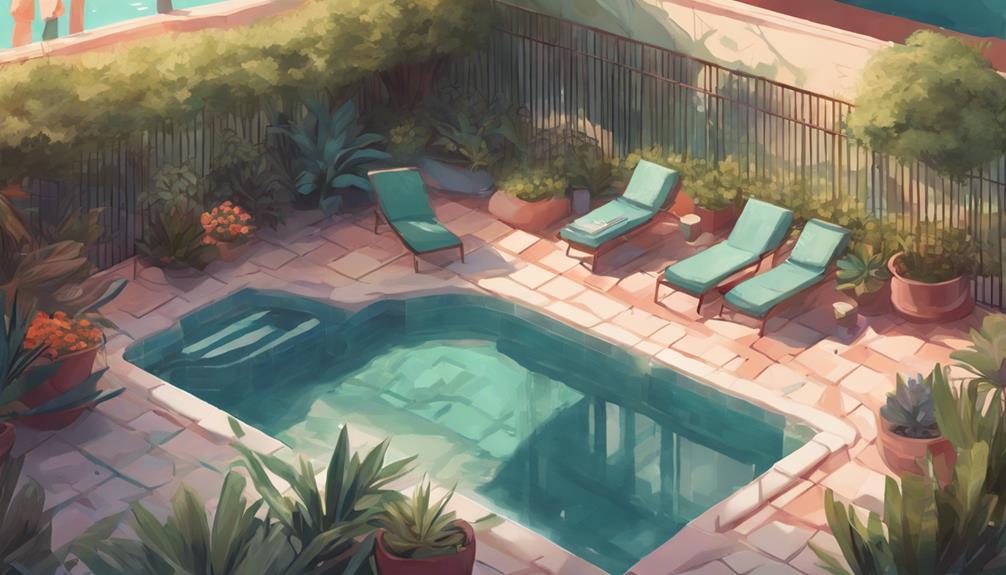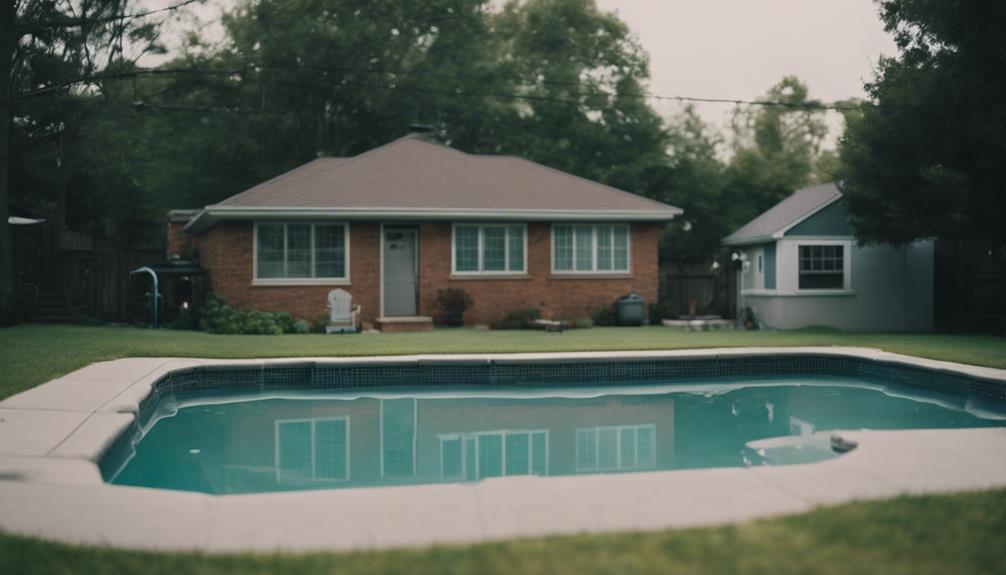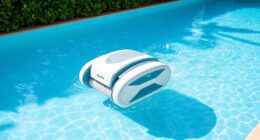For an efficient swimming pool construction in India, consider opting for vinyl liner pools for durability and cost-effectiveness. Use FRP panels to save on costs while maintaining quality. Factor in excavation costs at Rs. 100-120 per sq ft, plumbing costs at Rs. 200 per sq ft, and electrical installation costs at Rs. 100 per sq ft. Follow local regulations, evaluate soil conditions, and factor in utility connections and sunlight exposure. Hire reputable contractors with necessary licenses, ask for detailed proposals, and ensure clear communication. Monitor pH levels, clean filters, manage water levels, and use a cover for maintenance. Enhance enjoyment by adding water slides, LED lighting, heating, and saltwater chlorination.
Key Takeaways
- Choose cost-effective materials like vinyl liners or FRP panels.
- Ensure compliance with local regulations and assess soil conditions.
- Hire reputable contractors with necessary certifications and licenses.
- Maintain clear communication and request detailed project proposals.
- Consider adding special features like water slides or LED lighting.
Pool Construction Materials and Costs
When constructing a swimming pool in India, selecting the appropriate pool construction materials is vital to determine both the quality and cost of the project.
The cost of building a swimming pool in India can vary greatly, with factors such as the size and depth of the pool, the quality of the supplies, and the chosen construction method all playing a role.
Vinyl liner swimming pools, a popular choice in India due to their durability and lower costs, offer a cost-effective option compared to concrete pools. Additionally, using materials like FRP panels can further reduce construction costs while maintaining quality.
Excavation costs in India typically range from Rs. 100 to 120 per square foot, influencing the overall budget. Proper installation of plumbing and electrical systems is also essential, with costs averaging around Rs. 200 and Rs. 100 per square foot, respectively, to guarantee the functionality and safety of the swimming pool.
Location Considerations for Pool Building

Selecting the right location for pool building is vital in guaranteeing a successful and cost-effective construction project in India. Before commencing the construction of a swimming pool in India, it's important to take into account various factors.
First and foremost, make sure the chosen location complies with local regulations and legal requirements to avoid any issues during or after construction. Assess the soil conditions to prevent complications during excavation and ensure the pool's stability.
Evaluate the proximity to utility connections such as plumbing and electrical to streamline installation and reduce costs. Additionally, take into consideration the sun exposure in the area to optimize enjoyment and minimize maintenance costs.
Moreover, factor in the surrounding landscape and potential landscaping features to enhance the overall aesthetics of the pool area. By carefully considering these aspects, you can choose the most suitable location for your swimming pool construction project in India.
Hiring the Right Pool Contractor

To guarantee a successful swimming pool construction project in India, prioritize selecting an experienced pool contractor with the necessary certifications and licenses. When hiring the right pool contractor, consider the following:
- Experience: Look for pool contractors with a proven track record of building swimming pools in India.
- Certifications and Licenses: Make sure the contractor holds all the required certifications and licenses to carry out the construction work legally and professionally.
- Project Proposals and Cost Estimates: Request detailed project proposals and cost estimates from multiple pool contractors to compare and choose the most suitable option for your needs.
Additionally, maintaining clear communication and fostering a good relationship with the chosen pool contractor is essential for a smooth construction process. By paying attention to these key factors, you can ensure that your swimming pool construction project in India is handled efficiently and effectively.
Maintenance Tips for Indian Pools

Maintain your Indian pool in top condition by following these maintenance tips.
Regularly check and adjust the pH levels of your pool to prevent algae growth and maintain water quality.
Cleaning the pool filters and skimmers frequently is essential to guarantee excellent filtration and circulation, keeping your pool crystal clear.
Monitor and regulate water levels to avoid damaging the pool pump and equipment.
Utilize a pool cover when the pool isn't in use to minimize evaporation and keep out debris, helping to maintain the pool's cleanliness.
Additionally, consider hiring a professional pool maintenance service to provide thorough and efficient upkeep of your pool.
Adding Special Features to Your Pool

Enhance the appeal of your pool by contemplating the addition of special features such as a water slide or fountain. These additions not only elevate the visual aesthetics of your pool but also provide entertainment and relaxation for you and your guests.
To further enhance your pool experience, you may want to contemplate the following:
- LED Lighting: Incorporating LED lighting can create a mesmerizing ambiance around your pool area, adding a touch of elegance and style to your pool design.
- Heating System: Installing a heating system guarantees that you can enjoy your pool year-round, regardless of the outside temperature, providing you with comfort and relaxation whenever you desire.
- Saltwater Chlorination: Opting for a saltwater chlorination system offers a more natural and gentle swimming experience compared to traditional chlorine, enhancing the quality of your pool water and reducing maintenance efforts.
Frequently Asked Questions
How to Construct a Swimming Pool in India?
To construct a swimming pool in India, the first step is to determine the size, type, and materials based on your preferences and budget. Seek reputable contractors and obtain detailed quotes.
Plan for site preparation, excavation, plumbing, and electrical work. Choose quality tiling and finishes for durability. Keep in mind maintenance costs for long-term enjoyment.
Prioritize safety features like fencing and proper drainage. Research and meticulous planning are key for a successful pool construction project in India.
How Much Will It Cost to Build a Swimming Pool in India?
To build a swimming pool in India, costs vary based on factors like materials and size. A small concrete pool with tiling can start at 4 lakhs, while a luxurious pool with extra features may reach 15-20 lakhs.
Homeowners in India are willing to invest in luxury pools, contributing to higher construction costs. Be sure to factor in ongoing maintenance expenses alongside the initial construction cost for a complete picture of the investment.
Do I Need Permission to Build a Swimming Pool India?
Yes, you need permission to build a swimming pool in India. Obtaining permits from local authorities is essential to comply with zoning laws and green building codes.
You must submit architectural drawings for approval and secure liability insurance to protect against accidents. Regular maintenance and adherence to safety standards are necessary.
Guarantee legal compliance by following the required steps and obtaining the necessary permissions before starting construction.
What Is the Process of Building a Pool?
To build a pool, start with planning and design, then obtain necessary permissions.
Excavate the ground, install plumbing/electrical systems, and place FRP panels, pool liner, and vibe deck.
It's a meticulous process requiring attention to detail and adherence to regulations.
Remember, each step is vital for a successful pool construction.
Stay focused, follow the steps diligently, and enjoy the rewarding outcome of your new swimming pool.
Can the Construction Methods for a Vertical Swimming Pool be Applied in India?
The construction methods for a vertical swimming pool can certainly be adapted for use in India. With the growing popularity of vertical swimming pool design discovery, it’s important to consider the unique environmental and structural factors in India to ensure the success of these innovative and space-saving pools.
What are the best construction practices for a pool in India to ensure easy maintenance?
When building a pool in India, it’s important to follow the best construction practices for easy maintenance. Use high-quality materials, ensure proper drainage, and invest in efficient filtration systems. To keep the pool in top condition, regular cleaning and chemical balancing are essential maintaining pool tips india.
What are the important considerations for building a swimming pool in India, especially when contracting out the construction?
When contracting a pool build in India, it is important to consider local regulations and permits for construction. The climate and soil conditions should also be taken into account when planning the pool’s design and construction. Additionally, hiring a reputable and experienced contractor is crucial for a successful project.
Conclusion
To sum up, constructing a swimming pool in India requires careful planning, the right materials, and a reliable contractor. By considering location, materials, and maintenance, you can create a beautiful and functional pool for your home.
Remember, a pool isn't just a place to swim, but a sanctuary to relax and unwind after a long day. So, take the time to build it right, and enjoy the cool waters under the warm Indian sun.










